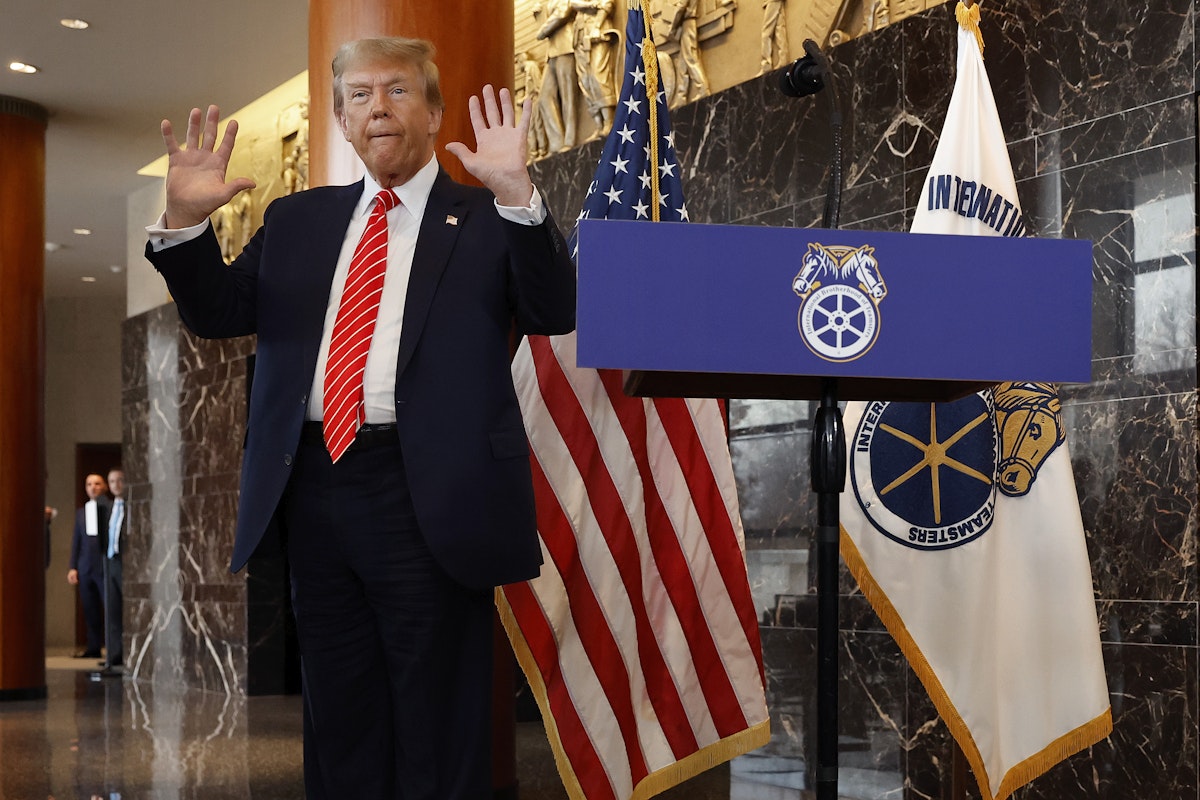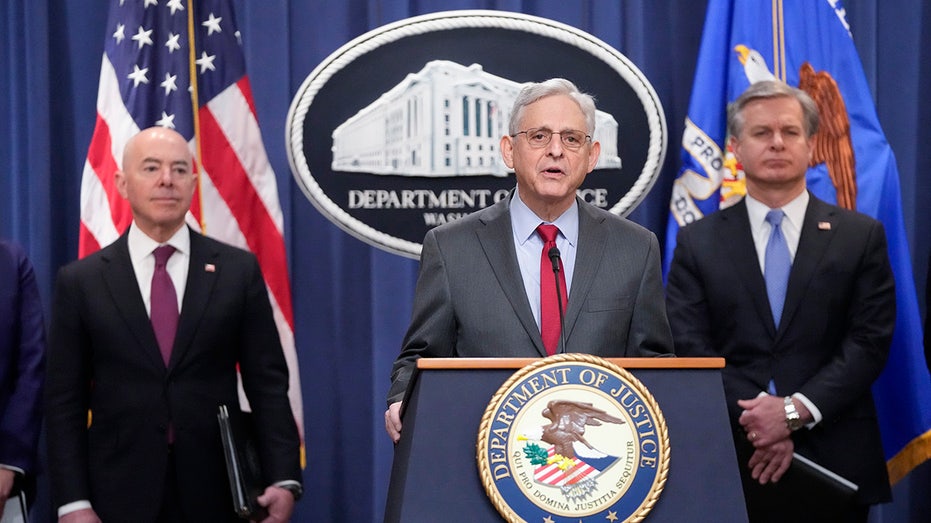Is Donald Trump About to Go Bankrupt?
Debt is becoming a major campaign issue in 2024. I don’t mean the national debt, which today stands at 99 percent of gross domestic product and which, the Congressional Budget Office projects, will total 116 percent of GDP 10 years from now. Nor do I mean student debt, which President Joe Biden has either reduced or eliminated for close to four million people, to the tune of nearly $138 billion. No, the debt that haunts campaign 2024 is personal debt—specifically the half-billion in fines that former President Donald Trump owes from two recent legal judgments against him. It’s a campaign issue because, judging from Trump’s past behavior, he will pay off this half-billion-dollar debt just as soon as pigs fly. So it was hardly shocking when The New York Times reported Monday that the former president’s plea for a loan to secure a bond against the largest share of his mounting debt was spurned by some 30 companies, prompting his lawyers to tell a New York State judge that raising the money is a “practical impossibility.” But one firm, Chubb, was willing to offer Trump $91 million to secure his bond in the E. Jean Carroll defamation case. Given the extreme unlikelihood that its generosity will be repaid in the traditional way, it’s an eyebrow-raising arrangement, as whoever lends Trump money will likely have to seek some other, less savory, compensation.Let’s first take a tally of the red in Trump’s legal ledger. The first judgment against him is an $83 million penalty for continuing to shoot his mouth off on social media about Carroll. This comes after Carroll won a separate $5 million judgment against Trump for sexually abusing her three decades earlier, and for defaming her after she wrote up the incident in 2019. The second judgment against Trump is a $355 million civil fraud penalty for misleading banks and insurers by pretending to be richer than he really was. Interest accrued before the ruling brought the total to about $454 million as of February 16, the day the judgment was handed down. Since then, additional interest has been piling up at a rate of $112,000 a day, adding another $3 million to the tab thus far. Between the two court judgments and their attendant penalties, Trump owes $539 million. Even for Trump, that’s a lot of money. Trump is rich but not (as Justice Arthur Engoron, who presided over the second trial, pointed out) anywhere near so rich as he pretends. In April 2023, Trump said in a deposition that he had “substantially more than $400 million in cash,” but Mother Jones’s Julianne McShane says it’s more like $350 million. Forbes puts Trump’s net worth at $2.6 billion; the trajectory over the past decade has been downward. The $539 million Trump owes in penalties represents 20 percent of his fortune. That’s a lot.Let’s not forget the additional financial liabilities Trump has lately accrued. There’s $392,000 that Trump paid The New York Times a couple of weeks ago for filing a frivolous lawsuit. There’s $938,000 that a judge last year ordered Trump and his attorney to pay Hillary Clinton for filing a frivolous lawsuit. There’s $382,000 that a London judge earlier this month ordered Trump to pay Orbis Business Intelligence, founded by Christopher Steele (of the “Steele dossier”), for filing a frivolous lawsuit. There’s the aforementioned $5 million that Trump paid earlier in the Carroll case. There’s $110,000 in contempt fees that Trump accrued for bad-mouthing New York Attorney General Letitia James during the civil fraud prosecution. There’s whatever penalty the IRS may impose when it completes its audit of Trump’s 2015–2019 tax returns. There’s whatever lawsuits Trump’s current lawyers will file when he (or various Trump PACs, or the Republican Party) get tired of paying them. On top of all that, Deutsche Bank’s loans to Trump require him to maintain $50 million in “unencumbered liquidity” and a minimum net worth of $2.5 billion. Trump always thinks he’s bleeding money, but right now Trump really is bleeding money—at a hemorrhagic rate. Some of Trump’s legal penalties will be reduced, of course; others may be dismissed on appeal. But I haven’t even furnished a complete list, and anyway, more lawsuits are certain to follow. Given all this, I predict that Trump will become the first ex-president since Ulysses S. Grant to declare personal bankruptcy. Maybe it will happen while Trump is serving a second term as president of the United States. Maybe it will happen while Trump is serving a prison sentence. Maybe it will happen while he’s doing both. If James follows through on her threat to seize Trump’s assets, it may happen as soon as next week.Somehow, Trump has to cough up that $539 million. Raise your hand if you would lend even $20 to a person so very famous for not paying his bills. The certainty born of experience that Trump will welsh casts immediate suspicion on anybody who agrees to be his personal banker. What motive does this lender possess? Just saying yes is practically a cr

Debt is becoming a major campaign issue in 2024. I don’t mean the national debt, which today stands at 99 percent of gross domestic product and which, the Congressional Budget Office projects, will total 116 percent of GDP 10 years from now. Nor do I mean student debt, which President Joe Biden has either reduced or eliminated for close to four million people, to the tune of nearly $138 billion.
No, the debt that haunts campaign 2024 is personal debt—specifically the half-billion in fines that former President Donald Trump owes from two recent legal judgments against him. It’s a campaign issue because, judging from Trump’s past behavior, he will pay off this half-billion-dollar debt just as soon as pigs fly. So it was hardly shocking when The New York Times reported Monday that the former president’s plea for a loan to secure a bond against the largest share of his mounting debt was spurned by some 30 companies, prompting his lawyers to tell a New York State judge that raising the money is a “practical impossibility.” But one firm, Chubb, was willing to offer Trump $91 million to secure his bond in the E. Jean Carroll defamation case. Given the extreme unlikelihood that its generosity will be repaid in the traditional way, it’s an eyebrow-raising arrangement, as whoever lends Trump money will likely have to seek some other, less savory, compensation.
Let’s first take a tally of the red in Trump’s legal ledger. The first judgment against him is an $83 million penalty for continuing to shoot his mouth off on social media about Carroll. This comes after Carroll won a separate $5 million judgment against Trump for sexually abusing her three decades earlier, and for defaming her after she wrote up the incident in 2019.
The second judgment against Trump is a $355 million civil fraud penalty for misleading banks and insurers by pretending to be richer than he really was. Interest accrued before the ruling brought the total to about $454 million as of February 16, the day the judgment was handed down. Since then, additional interest has been piling up at a rate of $112,000 a day, adding another $3 million to the tab thus far.
Between the two court judgments and their attendant penalties, Trump owes $539 million. Even for Trump, that’s a lot of money. Trump is rich but not (as Justice Arthur Engoron, who presided over the second trial, pointed out) anywhere near so rich as he pretends. In April 2023, Trump said in a deposition that he had “substantially more than $400 million in cash,” but Mother Jones’s Julianne McShane says it’s more like $350 million. Forbes puts Trump’s net worth at $2.6 billion; the trajectory over the past decade has been downward. The $539 million Trump owes in penalties represents 20 percent of his fortune. That’s a lot.
Let’s not forget the additional financial liabilities Trump has lately accrued. There’s $392,000 that Trump paid The New York Times a couple of weeks ago for filing a frivolous lawsuit. There’s $938,000 that a judge last year ordered Trump and his attorney to pay Hillary Clinton for filing a frivolous lawsuit. There’s $382,000 that a London judge earlier this month ordered Trump to pay Orbis Business Intelligence, founded by Christopher Steele (of the “Steele dossier”), for filing a frivolous lawsuit. There’s the aforementioned $5 million that Trump paid earlier in the Carroll case. There’s $110,000 in contempt fees that Trump accrued for bad-mouthing New York Attorney General Letitia James during the civil fraud prosecution.
There’s whatever penalty the IRS may impose when it completes its audit of Trump’s 2015–2019 tax returns. There’s whatever lawsuits Trump’s current lawyers will file when he (or various Trump PACs, or the Republican Party) get tired of paying them. On top of all that, Deutsche Bank’s loans to Trump require him to maintain $50 million in “unencumbered liquidity” and a minimum net worth of $2.5 billion. Trump always thinks he’s bleeding money, but right now Trump really is bleeding money—at a hemorrhagic rate.
Some of Trump’s legal penalties will be reduced, of course; others may be dismissed on appeal. But I haven’t even furnished a complete list, and anyway, more lawsuits are certain to follow. Given all this, I predict that Trump will become the first ex-president since Ulysses S. Grant to declare personal bankruptcy. Maybe it will happen while Trump is serving a second term as president of the United States. Maybe it will happen while Trump is serving a prison sentence. Maybe it will happen while he’s doing both. If James follows through on her threat to seize Trump’s assets, it may happen as soon as next week.
Somehow, Trump has to cough up that $539 million. Raise your hand if you would lend even $20 to a person so very famous for not paying his bills. The certainty born of experience that Trump will welsh casts immediate suspicion on anybody who agrees to be his personal banker. What motive does this lender possess? Just saying yes is practically a crime in itself.
Enter Chubb, the insurance company run by Evan Greenberg, son of Maurice “Hank” Greenberg—the colorful former chief executive of American International Group. On March 8 Trump, facing a March 11 deadline on the $83 million judgment, posted an appeal bond for $91 million. (An appeal bond is money you put up to guarantee payment of a court-imposed penalty pending an appeal that may reduce or eliminate the penalty. Trump’s bond is $91 million to cover interest.) The bond is insured by Chubb through Federal Insurance Company, an Indianapolis-based subsidiary. To obtain the bond, Trump had to pay an insurance premium of perhaps $2 million, and he had to put up collateral covering 100 percent of the bond. If Trump loses on appeal, Chubb will pay the court $91 million to award Carroll. Then comes the hard part. In theory, Chubb will seize the $91 million in assets that Trump put up as collateral. In practice, Trump will do everything he can to prevent this.
What’s in it for Chubb?
If you take Greenberg’s word for it, nothing—or so he assured investors in a letter last week:
When Chubb issues an appeal bond, it isn’t making judgments about the claims, even when the claims involve alleged reprehensible conduct.… We hardly support or subsidize defendants, or ‘take one for the team.’… I fully realize how polarizing and emotional this case and the defendant are and how easy it would be for Chubb to just say no.
Yes, it would have been easy for Chubb to say no. So why did it say yes? All Greenberg had by way of an answer was that everybody deserves his day in court and if Trump loses Chubb will grab his collateral.
Greenberg is no obvious Trump fanboy. Trump put him on his Advisory Committee for Trade Policy and Negotiations, but that and 50 cents will buy you a cup of coffee. Greenberg has donated to Republicans but not to Trump. After January 6 he issued a press release “condemn[ing] in the strongest terms the violence and display of demagoguery we witnessed in our nation’s capital.”
Social media has been buzzing that Trump secured his appeal bond with money from a Russian company, but that’s a red herring. Chubb does some business in Russia, but it is nobody’s idea of a Russian company; it’s based in Zurich. Vladimir Putin is not behind this.
What about the Aon connection? Aon, which is partnered with Chubb in multiple ventures, is an insurance company descended from W. Clement Stone’s Combined Insurance Company of America. Stone was a shady character who gave millions to Richard Nixon’s 1968 and 1972 campaigns in exchange for the promise he’d be made ambassador to the Court of St. James. (Nixon then double-crossed Stone and kept another billionaire donor, Walter Annenberg, in Grosvenor Square.) One can easily imagine Stone striking an unsavory deal with Trump, but he’s been dead 22 years, so let’s move on.
Aon was for many years the Trump Organization’s primary insurance broker. Aon’s executive vice president for risk, Pamela Newman, was Trump’s principal contact at Aon. Newman bears the dubious distinction of being the very first contributor to max out on Trump’s first presidential campaign, with a $2,700 contribution, according to the AP. Subsequently (again per the AP) the Trump campaign “paid the branch of Aon Risk Services where she works almost $300,000.”
But Aon’s cozy relationship with Trump created legal problems for the company after Trump became president. Newman left Aon in 2017, around the same time she joined the Trump administration in a voluntary capacity as a civilian aide to the acting secretary of the Army. After the uprising of January 6, 2021, Aon announced publicly that it was ending its relationship with Trump. That makes it unlikely Trump’s past dealings with Newman and Aon pushed Chubb to secure Trump an asset bond.
So what, then? Politics, maybe. Chubb’s PAC gives to both parties, but more heavily to Republicans. Regulation, maybe. Chubb spent $2.4 million last year lobbying against securities regulation. Or maybe it’s something we have yet to find out. What’s certain is that Chubb’s willingness to do business with Trump puts it under suspicion. It will remain under suspicion through this election year.
Who wants to put himself under the microscope next? Nobody, apparently. Trump must come up with an additional $454 million, plus interest, by March 25, and he says he hasn’t got it, and for once I believe him. Should somebody, miraculously, step forward to cover this remaining debt, that person or business will get four times the ethical scrutiny Chubb is suffering. For now, anyway, it appears there’s nobody dumb enough, or corrupt enough, to take Trump’s marker. A possible presidency is for sale and, amazingly, Chubb’s the only taker.


